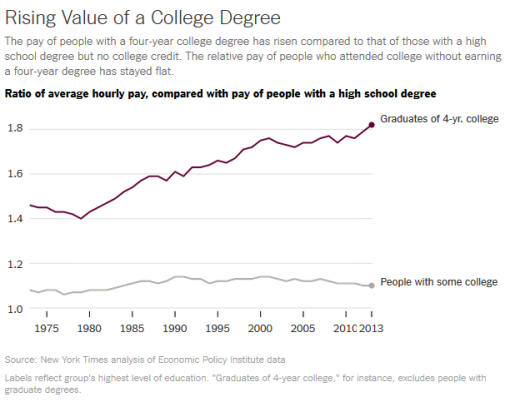 Stay in school not only for your own personal growth, but also there is a contributory correlation between education and income. That's not breaking news, it is a old sustainable fact. Additional income, employment and education information and graphs are available through Google, or other internet search engines: "education and income".
Stay in school not only for your own personal growth, but also there is a contributory correlation between education and income. That's not breaking news, it is a old sustainable fact. Additional income, employment and education information and graphs are available through Google, or other internet search engines: "education and income". SOC/John Will, Ph.D., Sociology blog, "Education pays: income by education level (2012 data update.)".
 |
| Graduate 4-year college vs. some college |
The good news for students hoping that more education leads to higher incomes is that recent data from the U.S. Census Bureau demonstrates a strong positive correlation: as educational level goes up, median income also rises." Read more.
Related article - Bloomberg Business Week/Business Schools/Natalie Kitroeff, 9/4/14. "College is more valuable than ever, and that's driving income inequality." "The cost of college is deepening the divide between the
richest and poorest segments of the country. Those who can afford a
degree should pursue one, though, because they’ll be far better off than
those who don’t, a new central bank report shows.
Reference - US Census Bureau 2012/College Board (Sandy Baum, Jennifer Ma, Kathleen Payea), "Education Pays 2013", "Trends in higher education series: the benefits of higher education for individuals and society." pdf pages 48. Technical, detailed data - US Census/education/earnings (2000).
Note graphs: 4-year graduates vs some college graph from New York Times analysis of Economic Policy Institute data from the SOC/John Witt, Ph.D. Sociology blog. Simplified 2010 census data graph from Tax foundation/Richard Morrison, 10/30/12.
Posted by Kathy Meeh


No comments:
Post a Comment